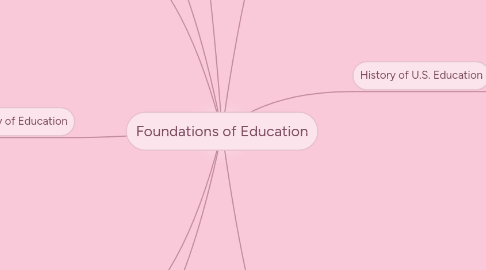
1. Philosophy of Education
1.1. Pragmatism
1.1.1. The philosophy the encourages people to search for the best possible route for them, to search for the best process to achieve their desired ends.
1.2. Generic Notions
1.2.1. Plato didn't trust the world of matter, he believed it was a place of unbalance and instability. Therefore matter was inaccurate measure because it was constantly changing.
1.3. Key Researchers
1.3.1. William James (1842-1910) John Dewey (1859-1952) George Sanders Pierce (1839-1914)
1.4. Goal of Education
1.4.1. Educators who subscribe to idealism are searching for the truth through ideas rather than the examination of the unstable world of matter
1.5. Role of teacher
1.5.1. It is the teachers responsibility to teach; to analyze and discuss ideas with students for them to move to the new levels so they can be transformed ultimately.
1.6. Method of Instruction
1.6.1. Students are encourages to work in groups or individually on research projects, both oral and written. There are lectures from time to time but the blank time is replaced with material not covered in the reading.
1.7. Curriculum
1.7.1. Specifically the study of classics in which most idealists support a back to basics approach that makes sure the basics of education are understood and mastered before the next steps.
2. Schools as Organizations
3. Curriculum & Pedagogy
4. Equality of Opportunity
5. Educational Inequality
6. Educational Reform
7. Politics of Education
7.1. Four Purposes of Education
7.1.1. Social: to work as one for many institutions and ensure cohesion. More specifically, to help improve social problems in todays society.
7.1.2. Economic: to prepare students for their later occupational roles and explain the division of labor. Also where students are taught to directly prepare students for the wide range of work in society.
7.1.3. Political: to teach students the basic laws of education as we prepare them to participate in the political order. Also to assimilate diverse cultural groups in a common political order.
7.1.4. Intellectual: teaching the basic cognitive skills such as reading, writing, and mathematics to help students understand more in depth knowledge. This purpose of education is the starting ground to furthering students education and understanding toward more specific subjects.
7.2. Perspectives
7.2.1. The Role of the School: Conservative - pushes the role to make sure all students are provided equal education
7.2.2. Explanations of Unequal Performance: Radicals - believe students with lower socioeconomic backgrounds begin school with unequal opportunity.
7.2.3. Definition of Educational Problems: Liberals - traditional curriculum does not fairly sustain to all students with the variety of backgrounds.
8. History of U.S. Education
8.1. Reform Movement
8.1.1. The Age of Reform: The Rise of the Common School
8.1.2. Cycles of Reform: Progressive and Traditional
8.1.2.1. Specifically focuses on the equality of education, making sure all students receive education at the level that they are ready for. Also this movement focuses on not only the process of education but on its goals.
8.1.3. Educational Reaction and Reform and the Standards Era (1900s to 2012)
8.2. Historical Interpretation
8.2.1. The Democratic-Liberal School
8.2.1.1. This specific history of education involves a school system that is committed to the equality of opportunity for all.
8.2.2. The Radical-Revisionist School
8.2.3. Conservative Perspectives
9. Sociological Perspectives
9.1. Theoretical Perspective - School and Society
9.1.1. Functionalism
9.1.1.1. Functional sociologist start with the base picture of society that focuses on the interdependence of the social system in which they often examine how well the parts fit in with each other. Sort of like a machine, functionality is determined how well everything goes along with it corresponding neighbors.
9.1.2. Conflict Theory
9.1.2.1. The school system is not perfect by any means and the conflict theory see the school as a social battlefield where students struggle against teachers and teachers against administrators and so on.
9.1.3. Interactionalism
9.1.3.1. Primarily critiques and extensions of the functional and conflict perspectives. Also focuses on the "big picture" and looking in detail and the problems in the school system that are overlooked by turning heads.
9.2. Effects of Schooling
9.2.1. Knowledge and Attitude
9.2.1.1. It is found that the higher the social class background, the higher the achievement level. It has been stated that the knowledge and attitude of students is very important.
9.2.2. Employment
9.2.2.1. Specifically talks about graduating from college will lead to greater employment opportunities which statistics states that it very true.
9.2.3. Education and Mobility
9.2.3.1. The belief that occupational and social mobility begins at the school door, civil religion, a belief that education is the equalizing factor in the "great status race".
9.2.4. Inadeguate Schools
9.2.4.1. The most obvious way that schools reproduce inequalities is through inadequate schools. A common factor now is that schools are not preparing the students for a productive and fulfilling life in the future.
9.2.5. Gender
9.2.5.1. Another way schools reproduce inequalities is through gender discrimination. It is very obvious that men and women are treated differently starting with the pay and going as far as the amount of jobs available based on gender alone.
